#fasiq
Text
Alhamdulillah Alloh Maha Sayang & Maha Menerima Tobat. Aku Jadi Kesayangan Alloh Saat Tobat Dari "Berkhianat" #Dakwah #Islam

Hadits #1485
وَعَنْ أَبِي هُرَيْرَةَ – رَضِيَ اللهُ عَنْهُ – قَالَ : كَانَ رَسُوْلُ اللهِ – صَلَّى اللهُ عَلَيْهِ وَسَلَّمَ – يَقُوْلُ : (( اللَّهُمَّ إِنِّي أَعُوذُ بِكَ مِنَ الجُوعِ ، فَإنَّهُ بِئْسَ الضَّجِيعُ ، وَأَعُوْذُ بِكَ مِنَ الخِيَانَةِ ، فَإِنَّهَا بِئْسَتِ البِطَانَةُ )) . رَوَاهُ أَبُو دَاوُدَ بِإِسْنَادٍ صَحِيْحٍ
Dari Abu Hurairah radhiyallahu ‘anhu, ia berkata, Rasulullah shallallahu ‘alaihi wa sallam mengucapkan, “ALLOHUMMA INNI A’UDZU BIKA MINAL JUU’, FA-INNAHU BI’SADH-DHOJII’, WA A’UDZU BIKA MINAL KHIYAANAH, FA-INNAHAA BI’SATIL BITHOONAH (artinya: Ya Allah, sesungguhnya aku berlindung kepada-Mu dari kelaparan, karena ia adalah sejelek-jeleknya teman tidur. Dan aku berlindung kepada-Mu dari pengkhianatan, karena ia sejelek-jeleknya teman yang menyertai).”
(HR. Abu Daud dengan sanad yang sahih)
[HR. Abu Daud, no. 1547 dan An-Nasai dari jalur ‘Abdullah bin Idris, ia berkata, telah menceritakan kepada kami Ibnu ‘Ajlan, dari Sa’id bin Abu Sa’id darinya dengannya. Syaikh Salim bin ‘Ied Al-Hilaliy mengatakan bahwa hadits ini sanadnya hasan, perawinya tsiqqah yaitu terpercaya, selain Muhammad bin ‘Ajlan di mana ia adalah perawi yang shaduq, jujur].
Keterangan hadits
Adh-dhajii’ artinya yang menemani engkau ketika tidur pada satu ranjang.
Khianat artinya tidak menunaikan amanat pada Allah Sang Khaliq dan pada makhluk.
Al-bithanah adalah berlaku khusus pada laki-laki yang dimaksud adalah sifat khusus yang ada dalam batin.
Faedah hadits
Sifat lapar menghalangi dari istirahatnya jiwa dan hati. Lapar melemahkan kekuatan dan berpengaruh pada pikiran yang kotor, dan berkhayal yang rusak, sehingga ibadah seseorang jadi berkurang. Oleh karena itu, Islam melarang puasa wishal, lanjut berpuasa tanpa berbuka.
Hendaklah kita menunaikan amanah dengan baik.
Hendaklah kita bisa istiqamah dan kokoh dalam berakhlak yang mulia dalam setiap keadaan.
Siapa saja yang mendapati sifat-sifat tercela pada dirinya, segeralah untuk memperbaiki diri, menghapus sifat jelek tadi, menyucikan diri, dan taat pada Rabbnya.
Siapa saja yang selamat dari sifat-sifat tercela, maka pujilah Allah yang telah menyempurnakan nikmat kepada kita, dan kita terus meminta kepada Allah agar bisa istiqamah.
Sumber https://rumaysho.com/21924-doa-meminta-perlindungan-dari-kelaparan-dan-sifat-khianat.html
بِسْمِ اللّٰهِ الرَّحْمٰنِ الرَّحِيْم – قُلْ هُوَ اللّٰهُ اَحَدٌۚ – اَللّٰهُ الصَّمَدُۚ – لَمْ يَلِدْ وَلَمْ يُوْلَدْۙ – وَلَمْ يَكُنْ لَّهٗ كُفُوًا اَحَدٌ
Allohumma solli ‘alaa muhammad, wa ‘alaa aali muhammad, kamaa sollaita ‘alaa aali ibroohim, wa baarik ‘alaa muhammad, wa ‘alaa aali muhammad, kamaa baarokta ‘alaa aali ibroohim, fil ‘aalamiina innaka hamiidummajiid.
Allâhumma-ghfir liummati sayyidinâ muhammadin, allâhumma-rham ummata sayyidinâ muhammadin, allâhumma-stur ummata sayyidinâ muhammadin.
Allahumma maghfiratuka awsa’u min dzunubi wa rahmatuka arja ‘indi min ‘amali.
#02TobatHebat#asysyakur#attawwab#berkhianat#fasiq#munafiq#nabiMuhammad#Taubat#tawwab#tobat#umatNabiMuhammad#Alloh#blogAlloh#tobathebat#umatRosululloh
0 notes
Photo
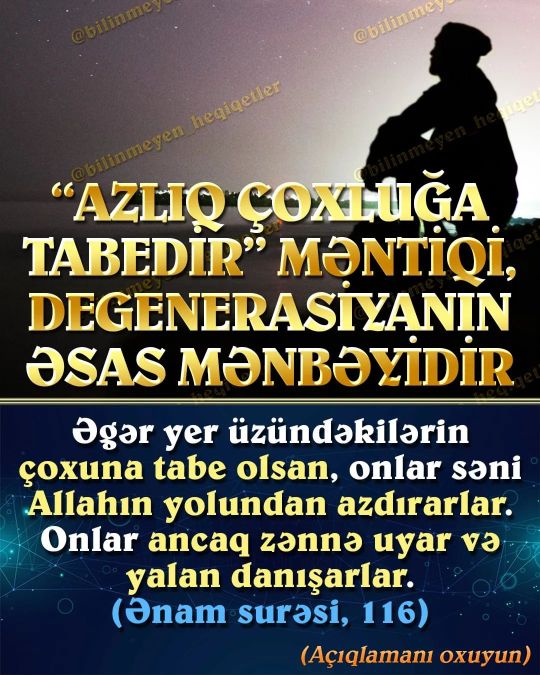
I Əsrlər boyu cəmiyyətdə bəzi insanlar çoxluğun etdiyini doğru qəbul etmişdir. Bəzi insanları din əxlaqının tələblərini yerinə yetirməkdən çəkindirən ən böyük maneələrdən biri də budur. İnsanları yaşadıqları cəmiyyətin onlar haqqında nə deyəcəyindən, nə düşünəcəyindən asılı edən bu yanlış düşüncə tərzi din əxlaqına uyğun yaşamayan əksər insanlar tərəfindən həyat tərzi kimi mənimsənilmişdir. Nəticədə, bu insanların cəmiyyətdə əksəriyyət təşkil etməsi digər insanları da səhv istiqamətləndirmiş və onları bu kütlənin yaşadığı yanlış həyat tərzinin və qayda-qanunlarının doğru olduğuna inandırmışdır. Halbuki düşünmədən əksəriyyətlə ayaqlaşmaq şeytanın bir oyunudur və insanı dünyada və axirətdə zərərə məruz qoyar. Quranda Allah müsəlmanlara belə əmr edir: Onların arasında Allahın nazil etdiyi ilə hökm ver və onların arzularına uyma! Allahın sənə nazil etdiyinin bir qismindən səni yayındıra biləcəklərinə qarşı diqqətli ol! Əgər onlar üz döndərsələr, bil ki, Allah onları ancaq bəzi günahlarına görə müsibətə düçar etmək istəyir. Həqiqətən, insanların çoxu fasiqdir. (Maidə surəsi, 49) Ayədən də məlum olduğu kimi, Allah insanlara haqsız çoxluğa və onların nəfslərinə uyğun qayda-qanunlarına tabe olmamağı əmr edir, Quran əxlaqına uyğun hərəkət etməyin həll yolu olduğunu bildirir. Ancaq insanların əksəriyyəti vicdanları qəbul etməsə də, özlərini çoxluğun həyat tərzi ilə ayaqlaşmağa məcbur hiss edir, bunu cəmiyyətin bir fərdi olmaq üçün labüd hesab edirlər. Halbuki əksəriyyətin nə etdiyi, nəyə inandığı, nəyi müdafiə etdiyi bir insan üçün əsla etibarlı mənbə və dəyər ölçüsü deyil. İnsanların bir hissəsi, eynilə haqq dinin əmri kimi “madam ki, bu cəmiyyətdə yaşayırıq, cəmiyyətin həyat tərzinə və qoyduğu qaydalara tabe olmalıyıq” məntiqinə tabe olmağa özlərini məcbur hiss edirlər. Din əxlaqının həqiqi mənasını qavramamış bu insanlar dünyada Allahın əmrlərindən başqa insanların tabe olduğu bəzi qaydalar olduğuna, insanın da sosial varlıq olduğuna görə, bu qayda-qanunlara əməl etməli olduğuna inanırlar (ardı rəydə) #quran #islam #dinipaylasimlar #Allah #namaz #dua #din #fasiq #çoxluq #azlıq https://www.instagram.com/p/CnwziB3Ignv/?igshid=NGJjMDIxMWI=
0 notes
Text
#Ali Nino#Əli Nino#kitab#kitabxana#allah#dünya#kuran#islam#din#quran#kafir#müsəlman#fasiq#isa məsih#xristian#xaçpərəst#siyasət#blogger
0 notes
Text
مرید ہونا کیسا ؟مفتی محمد صدام حسین برکاتی فیضی۔
مرید ہونا کیسا ؟مفتی محمد صدام حسین برکاتی فیضی۔
مرید ہونا کیسا ؟مفتی محمد صدام حسین برکاتی فیضی۔
مرید ہونا کیسا، ضروری ہے یا نہیں جواب تحریر فرمائے آپ کی نوازش ہوگی۔
سائل:انوار احمد کولکاتا مغربی بنگال۔
الجواب بعون الملک الوھاب
مرید ہونا سنت ہے۔ (فتاوی رضویہ جدید، ج٢٦، ص٥٧٠، مطبوعہ رضا فاؤنڈیشن لاہور) واللہ تعالیٰ ورسولہ ﷺ اعلم بالصواب۔
کتبہ: محمد صدام حسین برکاتی فیضی۔ صدر میرانی دار الافتاء وشیخ الحدیث جامعہ فیضان اشرف رئیس العلوم اشرف نگر…
View On WordPress
0 notes
Text
۩Mərhəmətli, Rəhmli Allahın adı ilə۩
32.18: Məgər mömin kimsə ilə fasiq eynidirmi?! Əlbəttə, onlar eyni ola bilməzlər!
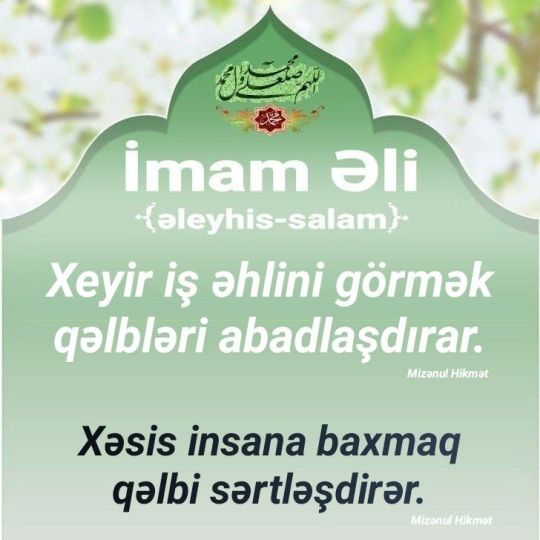
5 notes
·
View notes
Text
Catatan Kajian 💙
Ilmu tidak dikhususkan pada suku tertentu, atau pada golongan tertentu, maka jadilah penuntut ilmu, pelajarilah kitab-kitab.
Nabi Muhammad adalah seorang yang tidak bisa membaca dan menulis, namun karna mukjizat dari Allah, Rosulullah adalah orang yang mulia, meski seorang yang tidak bisa membaca dan menulis, tapi ‘alim, paling besar keilmuannya, Rosulullah adalah orang yang mulia, Rosulullah adalah samudera ilmu, seseorang yang terdidik, manusia yang paling baik, sempurna bentuk fisiknya.
Ayahnya wafat ketika Rasulullah berusia 2 bulan dalam kandungan Ibunya
Ibunya wafat ketika Rasulullah berusia 6 tahun
Nabi Muhammad tumbuh dalam keadaan yang berpendidikan, lalu siapa yang mengajarkannya?
Allah Ta’alah yang telah mengajarkannya
Maka, jika kita bukan seorang yang ‘alim, jadilah seorang yang belajar, jika tidak bisa jadi seorang yang belajar, maka jadilah pendengar, dan jika tidak bisa juga menjadi pendengar maka jadilah pecinta, ambil kitab dan belajarlah kepada guru atau orang yang lebih paham dan tsiqoh, cintai ilmu, cintai ilmu Agama, dan cintailah orang-orang yang berilmu, jadilah ke-4 golongan ini, golongan-golongan yang diberkahi, maka jangan jadi golongan yang ke-5, siapa golongan yang ke-5?
Golongan orang-orang yang membenci para Ulama, pengejek, pencaci-maki, golongan yang melecehkan para ulama, jangan jadi golongan ini.
Ingat!
Janganlah kita meremehkan 1 orang, karna seandainya kamu meremehkan 1 orang, maka kamu melakukan keremehan yang besar, perumpamaan sangking buruknya meremehkan orang lain.
Allah Ta’alah berfirman, “Janganlah kamu meremehkan I kaum lain, atau 1 perempuan lain, karna Allah ta’alah menyembunyikan Rahasia diantara hambanya.
Pertama, Allah Ta’alah menyimpan keridhoan-Nya dalam sebuah ketaatan, maka jangan meremehkan ketaatan
Kedua, Allah Ta’alah menyembunyikan kemurkaan-Nya dalam sebuah keburukan, maka jangan pernah meremehkan sebuah keburukan
Pentingnya kita menjaga hati kita, menjaga prasangka kita kepada Allah Ta’alah dan juga kepada hamba-Nya. Allah Ta’alah maha mendengar lintasan hati kita.
Malaikat tidak melihat, ataupun mendengar dan mengetahui lintasan hati kita.
Tapi Allah ta’alah maha mengetahui, lintasan hati kita terdengar seakan-akan seperti pengeras suara, hal ini dijelaskan dalam sebuah kisah, perjalanan Nabi Isa ‘Alaihissalam, dengan sahabat nabi isa (Hawariyy) dan seorang pemaksiat.
Nabi Isa adalah seorang yang taat, begitu juga dengan hawariyy (sahabat nabi isa ‘alaihissalam) seseorang yang melakukan ketaatan, dan terakhir seorang pemaksiat yang gemar sekali bermaksiat
dikisahkan bahwa ketiganya berjalan, dalam barisan pertama ada nabi isa alaihissalam, kemudian dalam barisan kedua ada sahabatnya hawariyy, dan yang ketiga adalah seorang yang melakukan kemaksiatan tadi (fasiq)
Dikisahkan bahwa seorang yang fasiq tadi terlintas didalam hatinya untuk mengikuti jejak-jejak langkah nabi isa dan hawariyy, dia sadar betul bahwa dia adalah pemaksiat, dan dia ingin mengikuti jejak langkah kebaikan nabi isa dan hawariyy
Namun berbeda dengan sahabat nabi isa hawariyy, ia terlintas sebuah keburukan dan prasangka buruk pada seorang yang fasiq tadi, ia takut bahwa orang fasiq yang berjalan dibelakangnya akan mengotorinya
Hanya lintasan, hanya lintasan hati, namun Allah ta’alah menjadikan pahala orang yang taat tadi hangus, dan menghanguskan dosa pemaksiat tadi, subhanallah :(
Hubabah berpesan bahwa betapa Maksiat hati juga besar dibanding maksiat jasmani
Mudah-mudahan Allah karuniakan kita hati yang senantiasa mampu untuk berprasangka baik kepada Allah dan juga kepada hamba-Nya, Aamiin
Noted:
Beprasangka baik kepada Allah, meski terkadang prasangka itu salah namun pasti baik akhirnya, dan sebaliknya
Berprasangka buruk kepada Allah, meski terkadang prasangka itu benar, namun hasilnya pasti salah dan tidak baik, karna telah berprasangka buruk kepada Allah Ta’alah…
Hubabah berpesan, tinggalkan banyaknya prasangka, jangan jadi seorang yang gemar mengejek orang lain, dan jangan jadi seorang yang mencari keburukan orang lain, itu bukan tugas kita, bukankah itu tugas 2 malaikat yang telah Allah Ta’alah tugaskan?
Bertaqwalah kepada Allah Ta’alah, Allah Ta’alah maha penerima taubat dan Allah maha pengasih.
Hubabah berpesan:
Jagalah Lisan kita dari pada perkataan yang justru membebani kita, betapa banyak orang yang binasa tersebab lisannya, lisan yang tak bisa dijaga laksana kalajengking, betapa banyak orang yang terbunuh tersebab lisannya, bukankah hal demikian justru berbuat buruk pada diri sendiri? Maka semoga kita senantiasa mampu menjaga lisan kita.
Semua ucapan dan perkataan membebani, lalu apa perkataan yang menguntungkan? Zikrullah
Menjalani hari dengan zikrullah (Mengingat Allah) laksana menjalani hari tanpa dosa, masyaa Allah.
…
4 hal yang semoga saja mampu kita terapkan dalam kehidupan kita
1. Hikmah
Berbicaralah dengan hikmah
2. Syafa’ah
Ketika kita berpuasa atas karunia Allah, kita taat atas karunia Allah, dan kita mampu bertetangga dengan baik dan lain-lain, atas karunia-Nya
3. Iffah
Menjaga diri
4. Al-Adl atau adil
Menempatkan sesuatu pada tempatnya, adil
...
Tidak mengucapkan sesuatu kecuali suatu perkataan yang membuat Allah Ridho, tidak menggunakan mata kecuali pada sesuatu yang Allah Ridhoi, menjaga pandangan, menjaga kemaluan, menjaga wajah (bagi wanita tidaklah ia bertabarruj dan berhias-hias dihadapan laki-laki ajnaby)
Nasihat Hubabah yang juga begitu mendalam, khususnya bagi anak muda.
Ketika kita galau karna Dunia, sedangkan Dunia sendiri adalah hal sepeleh yang sudah habis masanya bagi orang atau umat sebelumnya, ketika kita galau karna dunia? Bagaimana mungkin kita galau dengan Dunia? Huaa, yaa hubabah, Vidya masih sering galau Astagfirullah :(
Galau karna Dunia? Hal-hal yang seharusnya digalauin, mampukah kita berada ditelaga Rasulullah? Apakah kita akan mengambil catatan amal kita dengan tangan kanan? Apakah kita selamat dari panasnya api neraka? Mampukah nanti berbaris didalam barisan Sayyidah Fatimah :( Ya Allah… ini yang harusnya di galauin, ini yang harusnya dipikirin :(
Allah Ta’alah maha mengetahui dan juga maha melihat amal, amalan yang kita lakukan tak pernah terlepas dari pada pengetahuan-Nya, walaupun kecil, walaupun bagi kita sedikit.
Semoga kita mampu membimbing Anggota tubuh kita dari maksiat yang mematikan iman, kita manusia biasa yang pasti berbuat maksiat, jangan pernah lelah untuk bertaubat kepada Allah, setiap waktu, setiap hari dan setiap saat, meski nanti hilaf dan mengulangi maksiat yang sama, tetaplah bertaubat kepada Allah, semoga Allah ta’alah menjaga hati kita, menjaga kita dari maksiat, mintalah pada Allah agar diterima taubatnya, dan tidak kembali lagi pada maksiat.
آمين بجا ه رسول الله 💙
Sabtu, 26 Agustus 2023, Golden Sriwijaya Building
Catatan Kajian Jalsah Mahabbah bersama Hubabah Ummu Salim bin Hafidz
(Istri guru mulia Al-Habib Umar bin Hafidz)
Written by Your Sister of deen - @vidya.umayza
(Tolong diingatkan apabila terdapat kesalahan dalam merangkum kajian ini, semoga Allah ta’alah tetapkan kita dalam Ilmu dan Amal, Aamiin) -23.00 WIB
6 notes
·
View notes
Text
One day a man came to Khalid ibn Walid and said: such and such a man scolded you.
Khalid replied: This is his book, let him fill it with whatever he wants.
One person said to Wahb ibn Munabbih: such and such scolded you ..
he answered: did the shaitan not find a messenger besides you.
Once one person said to another: such and such a person scolded you. He replied: he fired his arrow at me and did not hit, so why did you bring this arrow and hit my heart with it?
Once a man came to imam Shafi and said: such and such a person mentions you badly..
The Imam answered him: "If you are telling the truth, then you are a namam (gossip and scammer), and if you are lying, then you are a fasiq (impious)."
The man became embarrassed and left.
3 notes
·
View notes
Text
RULING ON SMOKING
(Perfect and complete) Praise (with love and veneration) be (exclusively) to Allāh alone, and may Allāh confer the Highest Praise, Blessings and Peace upon our prophet, his family and Companions, as to what proceeds:
The Permanent Committee for Scholarly Research and Ifta' has read the Fatwa request submitted by His Eminence the Judge of Al-Bahah Court, Shaykh Abdul-Hayy ibn Hasan Kamal, to His Eminence Head of the Departments of Scholarly Research, Ifta', Dawah and Guidance under Number 323, dated 24/5/1391 A.H., that was referred by the General Secretariat of the Council of Senior Scholars under Number (2/242), on 26/3/1392 A.H.
Having studied the inquiry, the Committee understood that you asked for a Fatwa concerning what was mentioned by a preacher, that a smoker is not a Mu'min (believer); he does not enter Jannah (Paradise); and his testimony is not taken into account.
The Committee answered that smoking cigarettes is one of the sins.
If a person dies while committing a sin, they are left to the Will of Allah;
He can punish them in Hellfire and then let them enter Jannah;
or He can forgive them and let them enter Jannah without delay.
As for the ruling on them in this world, they are Mu'mins but also Fasiqs (someone flagrantly violating Islamic law) due to committing a major sin.
This is the view of Ahl-ul-Sunnah wal-Jama`ah (adherents to the Sunnah and the Muslim mainstream).
May Allāh grant us success, may Allāh confer the Highest Praise, Blessings and Peace upon our Prophet Muḥammad, his family, and all his Ṣaḥābah.
Group 1, Vol no. 22, page no. 176-178, Fatwa no. 32, The Permanent Committee for Scholarly Research and Ifta' [Member : Abdullah ibn Ghudayyan, Deputy Chairman : Abdul-Razzaq Afify, Chairman : Abdul-Aziz ibn Abdullah ibn Baz]
3 notes
·
View notes
Text
A DIVINE NO THAT ECHOS TILL DATE
" A person like me cannot pay allegiance to a person like Yazeed. Don't you know that right now on the face of the Earth there no one to be called the son of Rasool Allah (saww) other than me?...
Ubaidullah Ibn e Ziyad has made life difficult for us leaving only two options,
To accept a life of humiliation by paying allegiance in the hands of Ibn e Ziyad for a tyrant ruler like Yazid or to spill my blood in the way of Allah until my head is severed from my body.
Wallah! I prefer death over a life of humiliation. I will NEVER pay allegiance to Yazid!"
Reply of Imam Hussain (as) which writes the destiny (of eternal condemnation) of Yazid
A powerful NO that slaps the face of Yazid and all yazidis till date.
(same words in Urdu)
"""Mujh Jesa, Yazeed jese ki Bayat nahi ker sakta!!! Kia Tum nahi jantay k roe e Zameen per is waqt meray ilawa koi bhi farzand e Nabi (saww) nahi hay! ...
Ubaidullah Ibn e Ziyad ne hum per Zindagi dushwar ki Yahan tak k sirf do Rastay hen,
Ya tu men zillat ki Zindagi ko apna lon (zillat se Murad fasiq o fajir laeen yazeed ki Bayat Ibn e ziyad k hath per)
Ya phir rah e Khuda men khoon alood hojaon Yahan tak k Mera sir tan se Juda kerdia jae.
Men zillat ki Zindagi per mout ko tarjeeh deta hon. Men hargiz Yazeed ki Bayat nahi keronga!!!"""
Jawab e Hussain (as), Anjaam e Yazeed
Ta hashar Yazeed jeson ko mun per NAHI ka tamacha parta raheyga
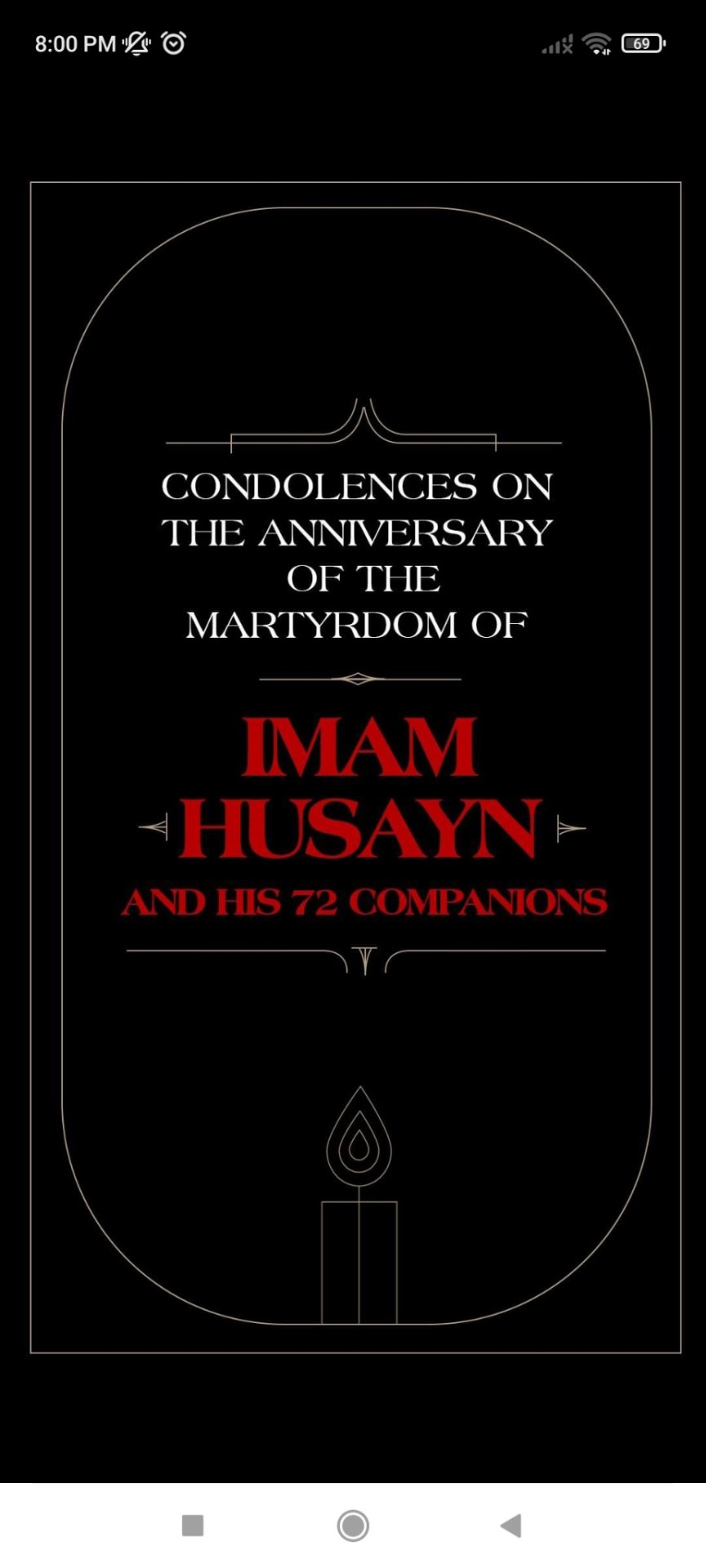
#islam#karbala#islamic#quotes#sayings#imam hussain#shia#i write karbala#hazrat imam hussain#imam husayn
2 notes
·
View notes
Text
Tafsir Ibn Kathir: Surah Al-Tawbah Ayah 107-108
In the Name of Allah, the Most Gracious, the Most Merciful.
9:107 And as for those who put up a Masjid by way of harm and disbelief and to disunite the believers and as an outpost for those who warred against Allah and His Messenger aforetime, they will indeed swear that their intention is nothing but good.
Allah bears witness that they are certainly liars.
9:108 Never stand you therein.
Verily, the Masjid whose foundation was laid from the first day on Taqwa is more worthy that you stand therein (to pray).
In it are men who love to clean and purify themselves. And Allah loves those who make themselves clean and pure.
Masjid Ad-Dirar and Masjid At-Taqwa
Allah says;
And as for those who put up a Masjid by way of harm and disbelief and to disunite the believers and as an outpost for those who warred against Allah and His Messenger aforetime,
The reason behind revealing these honorable Ayat is that;
before the Messenger of Allah migrated to Al- Madinah, there was a man from Al-Khazraj called "Abu Amir Ar-Rahib (the Monk).'' This man embraced Christianity before Islam and read the Scriptures. During the time of Jahiliyyah, Abu Amir was known for being a worshipper and being a notable person among Al-Khazraj.
When the Messenger of Allah arrived at Al- Madinah after the Hijrah, the Muslims gathered around him and the word of Islam was triumphant on the day of Badr, causing Abu 200
Amir, the cursed one, to choke on his own saliva and announce his enmity to Islam.
He fled from Al-Madinah to the idolators of Quraysh in Makkah to support them in the war against the Messenger of Allah. The Quraysh united their forces and the Bedouins who joined them for the battle of Uhud, during which Allah tested the Muslims, but the good end is always for the pious and righteous people.
The rebellious Abu Amir dug many holes in the ground between the two camps, into one of which the Messenger fell, injuring his face and breaking one of his right lower teeth. He also sustained a head injury.
Before the fighting started, Abu Amir approached his people among the Ansar and tried to convince them to support and agree with him. When they recognized him, they said, "May Allah never burden an eye by seeing you, O Fasiq one, O enemy of Allah!''
They cursed him and he went back declaring, "By Allah! Evil has touched my people after I left.''
The Messenger of Allah called Abu Amir to Allah and recited the Qur'an to him before his flight to Makkah, but he refused to embrace Islam and rebelled. The Messenger invoked Allah that Abu Amir die as an outcast in an alien land, and his invocation came true.
After the battle of Uhud was finished, Abu Amir realized that the Messenger's call was still rising and gaining momentum, so he went to Heraclius, the emperor of Rome, asking for his aid against the Prophet. Heraclius gave him promises and Abu Amir remained with him.
He also wrote to several of his people in Al- Madinah, who embraced hypocrisy, promising and insinuating to them that he will lead an army to fight the Messenger of Allah to defeat him and his call. He ordered them to establish a stronghold where he could send his emissaries and to serve as an outpost when he joins them later on.
These hypocrites built a Masjid next to the Masjid in Quba', and they finished building it before the Messenger went to Tabuk. They went to the Messenger inviting him to pray in their Masjid so that it would be a proof that the Messenger approved of their Masjid.
They told him that they built the Masjid for the weak and ill persons on rainy nights. However, Allah prevented His Messenger from praying in that Masjid. He said to them,
"If we come back from our travel, Allah willing.''
When the Messenger of Allah came back from Tabuk and was approximately one or two days away from Al-Madinah, Jibril came down to him with the news about Masjid Ad-Dirar and the disbelief and division between the believers, who were in Masjid Quba' (which was built on piety from the first day), that Masjid Ad-Dirar was meant to achieve. Therefore, the Messenger of Allah sent some people to Masjid Ad-Dirar to bring it down before he reached Al-Madinah.
Ali bin Abi Talhah reported that Ibn Abbas said about this Ayah,
"They are some people of the Ansar to whom Abu Amir said, `Build a Masjid and prepare whatever you can of power and weapons, for I am headed towards Caesar, emperor of Rome, to bring Roman soldiers with whom I will expel Muhammad and his companions.'
When they built their Masjid, they went to the Prophet and said to him, "We finished building our
Masjid and we would like you pray in it and invoke Allah for us for His blessings.''
Allah revealed this verse, (Never stand you therein), until,)9:108-109(
Allah said next,
they will indeed swear, those who built it,
(...wrongdoers).”
that their intention is nothing but good.
by building this Masjid we sought the good and the comfort of the people.
Allah replied,
Allah bears witness that they are certainly liars.
for they only built it to harm Masjid Quba', and out of disbelief in Allah, and to divide the believers. They made it an outpost for those who warred against Allah and His Messenger, such as Abu Amir the Fasiq who used to be called Ar- Rahib, may Allah curse him!
Allah said,
Never stand you therein,
prohibiting His Prophet and his Ummah from ever standing in it in prayer.
Virtues of Masjid Quba
Allah encouraged His Prophet to pray in Masjid Quba' which, from the first day, was built on Taqwa, obedience to Allah and His Messenger, for gathering the word of the believers and as an outpost and a fort for Islam and its people. This is why Allah the Exalted said,
Verily, the Masjid whose foundation was laid from the first day on Taqwa is more worthy that you stand therein (to pray).
in reference to the Masjid of Quba'.
An authentic Hadith records that the Messenger of Allah
said,
One prayer in Masjid Quba' is just like an
Umrah.
It is recorded in the Sahih that;
the Messenger of Allah used to visit Masjid Quba' while riding and walking.
Imam Ahmad recorded that Uwaym bin Sa`idah Al- Ansari said that;
the Prophet went to Masjid Quba' and asked,
In the story about your Masjid, Allah the Exalted has praised you concerning the purification that you perform. What is the purification that you perform!
They said, "By Allah, O Allah's Messenger! We do not know except that we had neighbors from the Jews who used to use water to wash with after answering the call of nature, and we washed as they washed.''
Ibn Khuzaymah collected this Hadith in his Sahih.
Allah's statement,
Verily, the Masjid whose foundation was laid from the first day on Taqwa is more worthy that you stand therein (to pray). In it are men who love to clean and purify themselves. And Allah loves those who make themselves clean and pure.
This encourages praying in old Masjids that were built for the purpose of worshipping Allah alone, without partners.
It is also recommended to join the prayer with the believing group and worshippers who implement their faith, those who perform Wudu perfectly and preserve themselves from impure things.
Imam Ahmad recorded that;
one of the Companions of the Messenger of Allah said that the Messenger of Allah led them in a Dawn (Subh) prayer in which he recited Ar-Rum (Surah 30) and made mistakes in the recitation. When he finished the prayer, he said,
We sometimes make mistakes in reciting the Qur'an, there are people among you who attend the prayer with us, but do not perform Wudu perfectly. Therefore, whoever attends the prayer with us let him make perfect Wudu.
This Hadith indicates that complete purification helps in the performance of acts of worship and aids in preserving and completing them.
#allah#quran#revert#dua#islam#help#religion#revert help#ayat#hadith#god#revert help team#welcome to islam
0 notes
Text
Marah-Marah 🔥
Bismillahirrahmaanirrahiim.
Pontianak. 30042023. 14:54.


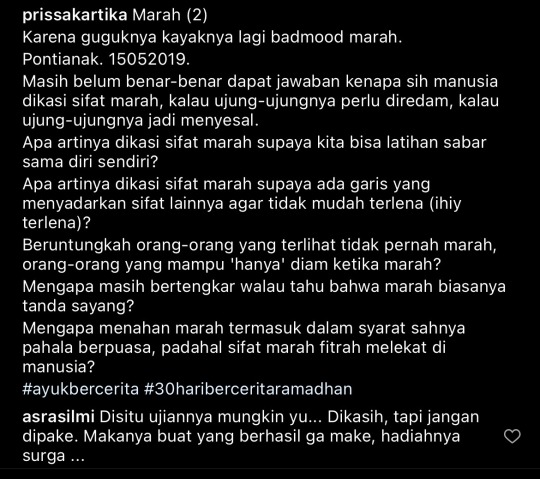
Beberapa hari lalu saya cari-cari resep kue di instagram sendiri, eh ketemunya ini.
Jadi ketawa kalau liat isi kepala dan hati diri sendiri di jaman dulu. Tapi baguslah, menertawakan diri sendiri kan jadinya. Lha ya sebaik-baik membandingkan memang cuma boleh sama diri sendiri kok, kita ini tambah baik atau tambah error.
Alhamdulillaah ayuprissa taun 2023 sekarang ketemu jawabannya, kenapa diciptakan perasaan marah, modal nyontek dari buku HAMKA dan Bahagia tulisan M. Alfan Alfian. Ajaibnya, ini buku yang dibeli tanggal 4 Februari 2015, tapi kok ya masih cocok di tahun 2023 ini, serasa baru pertama kali baca. Walau kuakui, aku suka jawaban Mimi bahwa marah diciptakan untuk ndak dipakai, supaya dapat hadiah surga. 💛
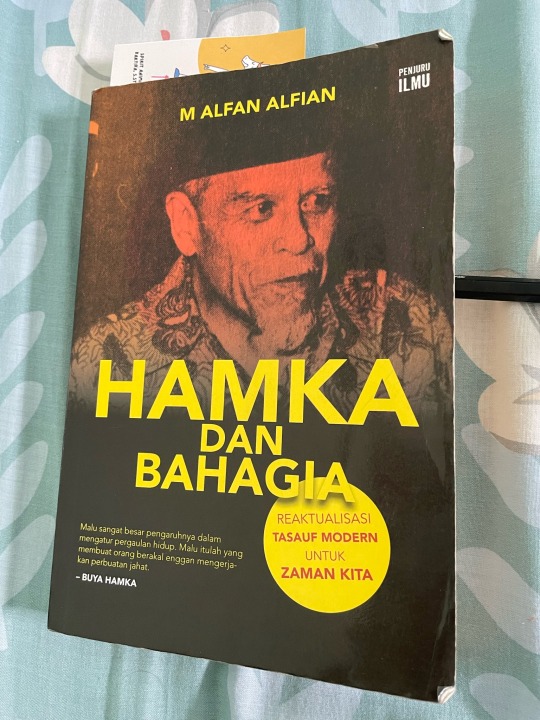
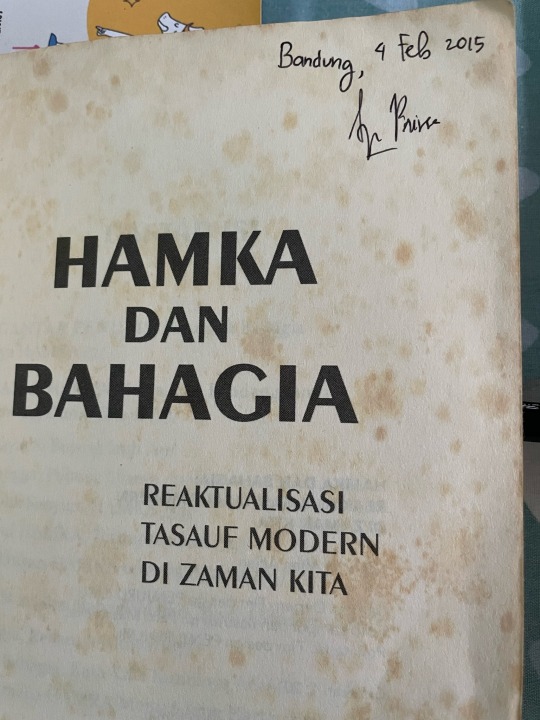
Di halaman 114 tertulis,
Kata Imam Al Ghazali: "Kesempurnaan bahagia itu bergantung kepada tiga kekuatan: kekuatan marah, kekuatan syahwat, dan kekuatan ilmu. HAMKA menggarisbawahi, bahwa sangatlah perlu manusia berjalan di tengah-tengah ketiga kekuatan itu.
Kalau kemarahan itu berlebihan, dapat kejadian memukul dan membunuh. Tetapi kalau kurang pula daripada yang mestinya, hilanglah diri dari perasaan cemburu (ghirah), hilang pula perasaan bertanggungjawab atas agama dan keperluan hidup atas dunia. Tapi kalau marah terletak di tengah-tengah, timbullah kesabaran, keberanian dalam perkara yang memerlukan keberanian, dan segala pekerjaan dapatlah dikerjakan menurut nikmat.
Demikian pula halnya dengan syahwat. Kalau syahwat bertambah-tambah, terjadilah fasiq (melanggar perintah Tuhan), onar (huru-hara). Kalau syahwat kurang teguh, terjadilah kelemahan hati dan pemalas. Kalau syahwat berjalan di tengah-tengah, timbullah 'iffah artinya dapat memerintah diri sendiri dan qanaah, yakni cukup dengan apa yang ada serta tidak berhenti berusaha.
Wawwwww baru segitu tulisannya, udah banyaaaak rasanya yang mesti saya pelajari, istilah-istilah yang baru dibaca, yang tak bisa langsung dipahami dengan modal google, mesti ada proses kunyah - telan - cerna. Itu saya tulis bukan karena saya benar, tapi sebagai bekal supaya ndak gampang marah-marah 🛸. Semoga kegiatan menyibuk-nyibukkan diri menulis ini, terhitung sebagai upaya membarokahi waktu hidup saya ya. Laa hawla walaa quwwata illa billaah.
Salam,
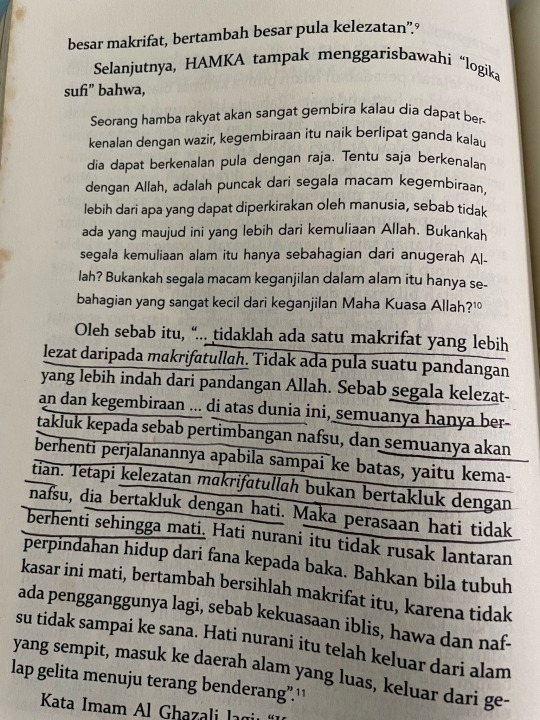
ayuprissa, yang dari kemarin pengen makan indomi.
0 notes
Text
کیا فاسق کی خود نماز بھی مکروہ تحریمی ہوتی ہے جو داڑھی وغیرہ کٹاتاہے؟
Kya Fasiq Ki Apni Namaz Makrooh e Tahreemi Hoti Hai ?
کیا فاسق کی خود نماز بھی مکروہ تحریمی ہوتی ہے جو داڑھی وغیرہ کٹاتاہے؟ جواب عنایت فرماکر مشکور ہوں۔ المستفتی: عبدالرشید سبطینی،
نائب امام و خطیب: رضا مسجد سمبل پور اڑیسہ 20/ جمادی الاولیٰ 1445ھ بروز منگل
باسمہ تعالیٰ جل و علا
الجواب بعون الملک المجیب العلیم الوھاب
فاسق معلن یعنی وہ شخص جو اعلانیہ گناہ کا ارتکاب کرے مثلاً داڑھی کاٹنے والا، اسکی…
View On WordPress
0 notes
Photo
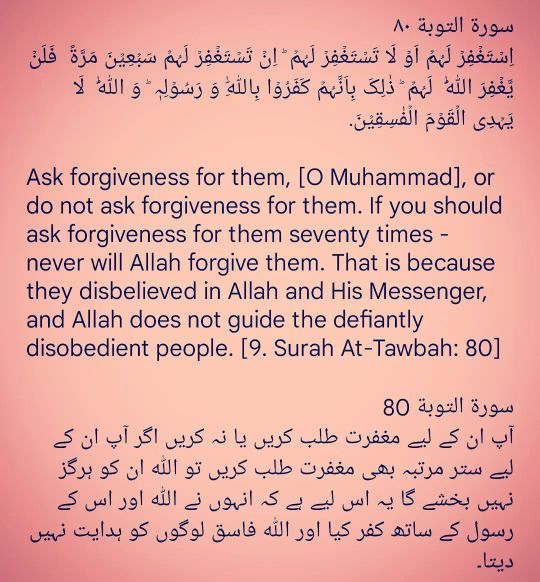
#Quran #DailyHadithSMS #Hadith #Islam سورة التوبة ٨٠ اِسۡتَغۡفِرۡ لَہُمۡ اَوۡ لَا تَسۡتَغۡفِرۡ لَہُمۡ ؕ اِنۡ تَسۡتَغۡفِرۡ لَہُمۡ سَبۡعِیۡنَ مَرَّۃً فَلَنۡ یَّغۡفِرَ اللّٰہُ لَہُمۡ ؕ ذٰلِکَ بِاَنَّہُمۡ کَفَرُوۡا بِاللّٰہِ وَ رَسُوۡلِہٖ ؕ وَ اللّٰہُ لَا یَہۡدِی الۡقَوۡمَ الۡفٰسِقِیۡنَ. Ask forgiveness for them, [O Muhammad], or do not ask forgiveness for them. If you should ask forgiveness for them seventy times - never will Allah forgive them. That is because they disbelieved in Allah and His Messenger, and Allah does not guide the defiantly disobedient people. [9. Surah At-Tawbah: 80] سورة التوبة 80 آپ ان کے لیے مغفرت طلب کریں یا نہ کریں اگر آپ ان کے لیے ستر مرتبہ بھی مغفرت طلب کریں تو اللہ ان کو ہرگز نہیں بخشے گا یہ اس لیے ہے کہ انہوں نے اللہ اور اس کے رسول کے ساتھ کفر کیا اور اللہ فاسق لوگوں کو ہدایت نہیں دیتا۔ Surah At-Tawbah: 80 Aap en k leay maghfarat talab karain ya na karain, agr Aap en k leay sattar martaba bhi maghfarat talab karain to ALLAH enko hergiz nahi bakhshay ga, ye es leay hai k enhon ny ALLAH aur Us k Rasool k sath kufr kia aur ALLAH fasiq logon ko hidayat nahi deta. https://www.instagram.com/p/CpyicP7IgcZ/?igshid=NGJjMDIxMWI=
0 notes
Note
I do not get on well very well with my parents and my mother says related to any minor issue that if I do not do what she wants, she will not pray for me and that I will not prosper and be happy at all. What should I do in that case?
It will be more appropriate for you to say, “I try to fulfill their halal requests as much as I can and win their hearts” instead of saying “I do not get on well very well with my parents.”
First of all, focus on what you do, how you do it, and what you should do. Do not focus on what your parents do or should do and on their duties. Accordingly:
- Fulfill their halal requests.
- Try to win their hearts and please their hearts.
- Treat them with compassion, respect and mercy.
- Never be offensive in terms of attitude and words; be their shelter and win a place in their hearts.
- If they ask for something you cannot do, explain it to them kindly and softly.
- If your explanation is likely to hurt them, keep silent
- Never obey if they ask for something bad, but do not respond; keep silent.
- Pray for them frequently.
- Pay great attention to the rights of Allah and the rights of the people.
- Do not complain about your parents except when asking questions, etc.
Remember the criteria above often and try to read and apply from time to time the other information we will give:
It is Fard to Fulfill the Halal Requests of the Parents
It is seen that the issue of respect for parents is most widely dealt with verses 23, 24 and 25 of the chapter of al-Isra in the Quran. It is stated in those verses that it is fard to do good to parents after worshipping Allah.
It is mentioned in tafsir books that goodness (ihsan) in those verses is unconditional, and it is concluded that it is necessary to obey the parents regardless of whether they are Muslims or non-Muslims, virtuous or sinful (fasiq) people.
However, in the last verses and in verse 8 of the chapter of al-Ankabut and verse 15 verse of the chapter of Luqman, an exception is introduced in terms of obedience to parents: their effort and desire to turn their children away from Islam and to make them associate partners with Allah.
Acting upon both those verses and the hadith of the Prophet (pbuh) “A person cannot be obeyed related to an issue that is considered as disobedience to Allah” (Bukhari, Ahkam, 4), moralists state that it is not permissible to fulfill the wishes of the parents that are clearly known to be haram but that it was necessary to fulfill their demands that are not religiously haram.
It is a sin to say even fie (uff) to parents
The following is stated in verse 23 of the chapter of al-Isra: “Do not say even ‘fie (uff)’ to them” as the simplest expression of disrespect toward parents. Scholars of tafsir and ethics state that this word, which expresses inner distress, covers all kinds of disrespect and disobedience.
In verse 24, parents are asked to be protected with an understanding of humility originating from the feeling of mercy and the following is stated: “Say: ‘My Lord! Bestow on them thy Mercy even as they cherished me in childhood’.”
It is significant that mercy is mentioned as the most fundamental reason for respect for parents, and hence the importance of the emotional bond between parents and children is emphasized. The feeling of mercy is the basis of the material and spiritual bond between children and their parents. Since Allah’s bounties and blessings depend on His mercy, asking Allah for mercy on parents means asking for all other divine favors.
The first topic that is dealt with in hadith collections related to ethics is the ethical duties toward parents. The issue is generally dealt with in two ways in those hadiths:
1) Doing Good to Parents and Obedience to them
In some hadiths, the importance of goodness and obedience to parents is emphasized with the concepts of “ihsan” and “birrul-walidayn”. As a matter of fact, in a hadith included in all hadith sources, the Prophet (pbuh) lists the most important deeds according to their value in the eye of Allah as “prayer (salah) performed on time, kindness to parents (birrul-walidayn) and jihad in the way of Allah“. ( see Bukhari, “Adab“, 1; Muslim, “Iman“, 137)
Besides, in a long hadith included by Bukhari and some other hadith scholars, it is seen that one of the primary good deeds that enable the prayers people to be accepted when they are in a difficult situation is respect and treats to parents. (see Bukhari, Adab, 5)
2) It is a sin to disobey parents
Some of the hadiths about moral duties toward parents are about the prohibition of disobedience to them and this disobedience is usually expressed with the concept “uquq”.
As a hadith and ethical term, uquq expresses negative feelings and behaviors such as disobedience, torture and insult that will hurt the heart of the parent, break the bond of love between the parent and the child, and is generally used as the opposite of “birr”. (see Ayni, XVIII, 121)
In one of his statements mentioned in all hadith sources, the Prophet (pbuh) lists the main religious-ethical evils known as “kabair” (major sins) as “associating partners with Allah, disobedience to parents and bearing false witness”. (Bukhari, Adab, 6; Muslim, Iman, 143, 144)
The Prophet (pbuh) also mentions the following:
- He states that Allah will postpone the penalty of many sins that He wills until the Day of Judgment, but that He will begin the punishment of those who disobey their parents in this world. (see Dhahabi, p. 44).
- and he also mentions the curses that parents make on their children among the requests that are not turned down by Allah. (see Bukhari, “Adab”, 5)
Rights of Parents
Islamic moralists state, as a rule, that the parents have the rights that all people and Muslims have mutually, related to the child, and they also list other special duties that must be fulfilled toward parents.
The main rights of parents are as follows:
- To try to meet the material and spiritual needs of the parents and to ensure that they lead a peaceful life,
- To give them things before they want,
- Not to expect excessive sacrifices from them,
- Not to complain about them,
- To hide their faults and to protect their reputation by talking about their kindness,
- To ignore their non-serious faults in terms of religion,
- To warn them without hurting them even in issues that are a religious necessity to warn,
- To pray for them when they are alive and after their death,
- To fulfill their desires that are not haram,
- To help them in their charity and worship,
and other ethical rules determined by the religion and ethics.
Another important issue included in the hadiths regarding the issue is the need to maintain the relationship with their friends after the death of the parents in order to keep their memories alive, which is a duty of loyalty and appreciation of the son and daughter.
#Allah#god#islam#quran#muslim#revert#convert#revert islam#convert islam#reverthelp#revert help#revert help team#help#islam help#converthelp#prayer#salah#muslimah#reminder#pray#dua#hijab#religion#mohammad#new muslim#new convert#new revert#how to convert to islam#convert to islam#welcome to islam
1 note
·
View note
Text
THE COMPANIONS OF THE PROPHET (PBUH) : Hanzala Ibn Abi Amir (r.a.)
Hanzala Ibn Abi Amir was a valiant man who longed to become a martyr. He got married one day before the Battle of Uhud and left home to fight the polytheists at Uhud the next morning. His dead body was washed by angels.
He was one of the notables of the Aws tribe. He was very strong and shrewd; he had high ethics. Before Islam, he used to live in seclusion and worship. He practiced the religion of Hanif. He liked living in seclusion. He hated worshipping idols.
Hanzala Ibn Abi Amir became a Muslim after the Messenger of Allah (pbuh) came to Madinah. His father, Abu Amir, was together with the enemies of the Prophet. When the Prophet came to Madinah, he went to Makkah and joined the polytheists. Therefore, he was given the nickname fasiq.
Hanzala (r.a.) was known as “Taqi” (pious) among his friends. He had high ethics. The belief in his heart became exuberant. He was always together with the Messenger of Allah. His father joined Makkan polytheists with a group of fifty people from his tribe and formed a front against the Messenger of Allah (pbuh).
Hanzala took part in the Battles of Badr and Uhud; he fought heroically. He was single when he took part in the Battle of Badr. A little while after this battle, he got engaged to Abdullah Ibn Ubayy Ibn Salul's daughter, Jamila, who became a Muslim. Their marriage took place one day before the Battle of Uhud. On the night of the marriage, the Messenger of Allah and his Companions were going to set off to go to Uhud. He asked permission from the Messenger of Allah (pbuh) to spend the night at home. The prophet gave him the permission.
Hanzala, who had just got married, spent the night with his wife. He left home early in the morning and caught up with the Prophet at Uhud. When the Prophet arranged the ranks for the battle, he joined the Companions.
Hanzala, who displayed great heroism on the Day of Uhud, attacked the polytheists zealously like the other Companions. He attacked them with the desire of being a martyr. He attacked them with his sword without having a rest. He fought all day by shooting arrows and swinging his sword around. The polytheists started to run away. Abu Sufyan, the commander of the army of the polytheists was left alone When Hanzala saw him, he drew his sword and cut off the legs of his horse. Abu Sufyan fell down with his horse. Abu Sufyan, who was very afraid, did not know what to do. He started to shout as loudly as he could, "O Qurayshis! I am Abu Sufyan. Hanzala is going to kill me; save me!" At that moment, everybody was busy with saving himself. Nobody seemed to heed him. While Hanzala was preparing to attack him, Saddat Ibn Aswad approached him from behind and hit Hanzala on the back with his spear. Hanzala wanted to hit him but Saddat hit him again and martyred him.
Abu Sufyan, who organized the expedition of Uhud in order to take the revenge of the Battle of Badr, accepted the death of Hanzala in return for the death of his son, Hanzala, in the Battle of Badr. He regarded him to have been killed for his son. The polytheists started to cut off the organs of the martyrs with the feeling of revenge. Hanzala's father Abu Amir, who was a polytheist, prevented his dead body from being harmed.
When Hanzala was martyred, the Messenger of Allah said about him,
“I saw the angels wash Hanzala between the sky and the earth from a silver tray with rain water.” Abu Usayd Said said, “I went to see Hanzala and saw rain water dropping down from his head. I returned and told the Messenger of Allah about it. The Messenger of Allah sent somebody to his wife and asked her about it. His wife said Hanzala left home in a hurry without making ghusl to catch with the Muslims at Uhud. After this incident, he was called “Ghasilu’l-malaika = the person who was washed by angels”. The tribe of Aws took pride in him saying, “Hanzala, who was washed by angels, is from our tribe.”
Hanzala's wife, Jamila, saw a dream on the night of the wedding.In the morning, she called four family members of Hanzala and made them witnesses to the actualization of her wedding with Hanzala. She said if she had a baby, it would belong to Hanzala. The witnessed asked, “Why did you find this necessary?” Jamila told them about the dream she had. She said, “In my dream, I saw the sky open to Hanzala and it shut again after he had entered into it.” Her dream turned out to be true and Hanzala was martyred. She had a child called Abdullah. This child known as Abdullah Ibn Hanzala is the Abdullah that the people of Madinah paid allegiance against Yazid Ibn Muawiya. He was martyred during the time of Yazid.
We ask Allah Almighty to enable us to attain the intercession of both the father and his son. Amin.
#Allah#god#islam#quran#muslim#revert#revert islam#convert#convert islam#converthelp#reverthelp#revert help#revert help team#help#islam help#salah#dua#prayer#pray#reminder#religion#mohammad#muslimah#hijab#new muslim#new revert#new convert#how to convert to islam#convert to islam#welcome to islam
1 note
·
View note
Text
MAKNA HIDAYAH dan DALALAH
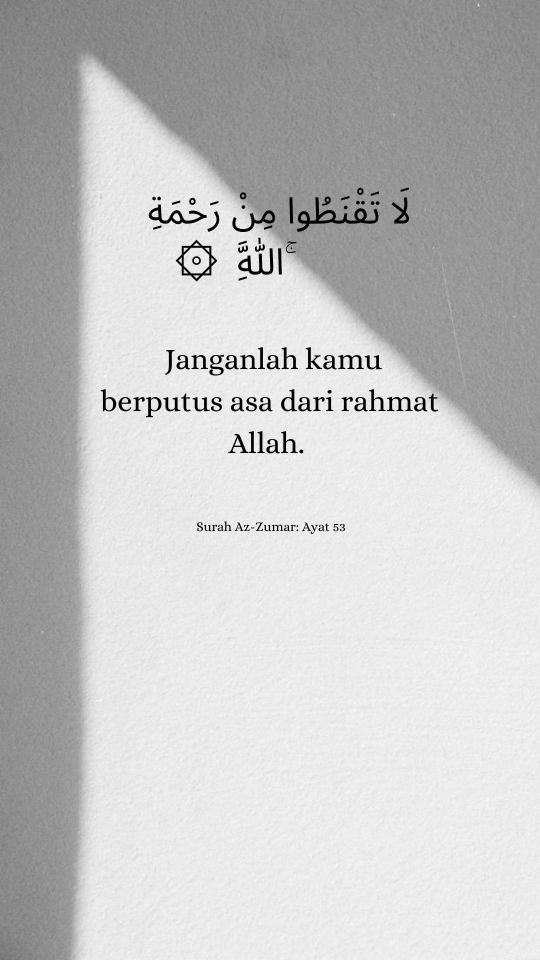
Pemateri : Ustadzah Meti Astuti., S.EI, M.EK
Notulensi : Annisa N
Hidayah
Hidayah memiliki arti penerangan atau petunjuk. Menurut syara' adalah mengikuti petunjuk Islam dan mengimaninya.
Dalalah
Kesesatan (Dalalah) arti kebalikan dari penerangan atau petunjuk. Menurut syara'a adalah menyimpang dari syariat Islam.
Hidayah
Menguasai manusia ?
Berasal dari Allah Subhanahu wa ta'ala, dikategorikan Qadha Allah Subhanahu wa ta'ala ngga di hisab. Artinya Allah Subhanahu wa ta'ala telah memberikan ini kepada semua manusia, sehingga manusia ngga bisa menolaknya sebagai modal kehidupan.
Dikuasai manusia ?
Benar-benar berasal dari usaha manusia, sehingga akan dihisab.
Kesalahan umum
Biasanya orang-orang memahami bahwa hidayah dan kesesatan berasal dari Allah Subhanahu wa ta'ala.
Pemahaman Umum Yang Ternyata Salah
Mereka yang beranggapan seakan-akan hidayah itu bukan dalam kekuasaan manusia melainkan dari Allah Subhanahu wa ta'ala, tapi apakah benar demikian ? jika demikian dimanakah letak keadilan Allah Subhanahu wa ta'ala ? lalu untuk apa Allah Subhanahu wa ta'ala ciptakan surga dan neraka ?
Konsekuensi anggapan bahwa manusia itu mendapatkan hidayah atau kesesatan dari Allah Subhanahu wa ta'ala. Logikanya bagaimana keadilan Allah Subhanahu wa ta'ala kalau memang ada orang yang dikehendaki masuk surga dan neraka tanpa upaya atau peran manusia sama sekali.
مَنْ عَمِلَ صَالِحًا فَلِنَفْسِهٖ ۙوَمَنْ اَسَاۤءَ فَعَلَيْهَا ۗوَمَا رَبُّكَ بِظَلَّامٍ لِّلْعَبِيْدِ
"Barang siapa yang mengerjakan amal yang sholah maka (pahalanya) untuk dirinya sendiri dan barangsiapa yang mengerjakan perbuatan jahat, maka (dosanya) untuk dirinya sendiri; dan sekali-kali tidaklah Rabb-mu menganiaya hamba-hamba-Nya." (Qs Fushillat : 46)
Hakekat Masalah Hidayah dan Kesesatan, dapat di pahami oleh Ayat-Ayat berikut ini :
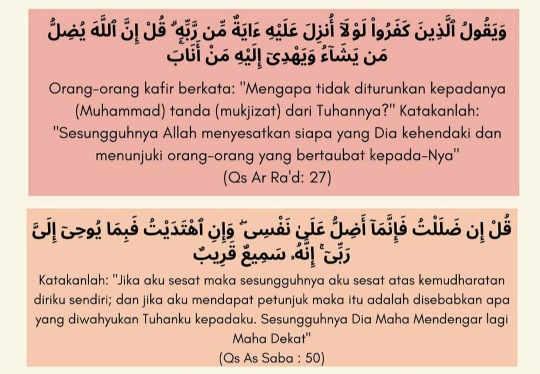
Tiga Macam Hidayah
Hidayah Khalqiyah
Hidayah penciptaan manusia yang diberikan Allah Subhanahu wa ta'ala kepada setiap manusia berupa fitrah tauhid dan kecenderungan pada kebenaran. Allah Subhanahu wa ta'ala memberikan naluri dengan akal nya, sehingga manusia dapat membedakan mana yang benar dan salah.
Hidayah Irsyad Wal Bayan
Hidayah yang diberikan Allah Subhanahu wa ta'ala kepada manusia berupa tuntunan dan penjelasan dengan mengutus seorang Rasul dengan membawakannya Al-Qur'an.
Hidayah Taufiqiyah
Hidayah yang diberikan Allah Subhanahu wa ta'ala berupa dukungan, pertolongan, kemudahan, kekuatan untuk menerima kebenaran. Hidayah ini hanya diberikan kepada orang sungguh-sungguh menerima kebenaran.
Sifat yang Bertentangan dengan Hidayah
Ingkar
Dzalim (aniaya)
Fasiq (fasik)
Takabur (sombong)
Dholal (sesat)
Hubbud-dunya (mencintai dunia)
Musrif (berlebihan)
Kadzib (pendusta)
اِنَّ الَّذِيْنَ لَا يُؤْمِنُوْنَ بِاٰيٰتِ اللّٰهِۙ لَا يَهْدِيْهِمُ اللّٰهُ وَلَهُمْ عَذَابٌ اَلِيْمٌ
"Sesungguhnya orang-orang yang tidak beriman kepada ayat-ayat Allah Subhanahu wa ta'ala (Al-Quran), Allah Subhanahu wa ta'ala tidak akan memberi petunjuk kepada mereka dan bagi mereka azab yang pedih." (Qs An-Nahl : 104)
Hukuman bagi yang Memiliki Sifat Bertentangan dengan Hidayah
Allah Subhanahu wa ta'ala akan memalingkan hatinya dari kebenaran
Allah Subhanahu wa ta'ala tidak akan memberikan petunjuk (Taufiq Hidayah)
Allah Subhanahu wa ta'ala akan mengunci hatinya dari kebenaran
Allah Subhanahu wa ta'ala akan menutupi hatinya dari kebenaran
🍁✨🍁✨
وَاِذْ قَالَ مُوْسٰى لِقَوْمِهٖ يٰقَوْمِ لِمَ تُؤْذُوْنَنِيْ وَقَدْ تَّعْلَمُوْنَ اَنِّيْ رَسُوْلُ اللّٰهِ اِلَيْكُمْۗ فَلَمَّا زَاغُوْٓا اَزَاغَ اللّٰهُ قُلُوْبَهُمْۗ وَاللّٰهُ لَا يَهْدِى الْقَوْمَ الْفٰسِقِيْنَ
"Dan (ingatlah) ketika Musa berkata kepada kaumnya, “Wahai kaumku! Mengapa kamu menyakitiku, padahal kamu sungguh mengetahui bahwa sesungguhnya aku utusan Allah kepadamu?” Maka ketika mereka berpaling (dari kebenaran), Allah memalingkan hati mereka. Dan Allah tidak memberi petunjuk kepada kaum yang fasik." ( Qs As Shaff : 5)
Doa yang Banyak di Panjatkan Rasul
اِهْدِنَا الصِّرَاطَ الْمُسْتَقِيْمَ ۙ
"Tunjukilah kami jalan yang Rasul" (Qs Al Fatihah : 6)
يَا مُقَلِّبَ الْقُلُوبِ ثَبِّتْ قَلْبِى عَلَى دِينِكَ
"Ya Allah, yang kuasa membolak-balikan hati, tetapkanlah hatiku dalam agama-Mu." (HR Tirmidzi dan Al Hakim)
Doa Meminta Diberi Keteguhan Hati
رَبَّنَا لَا تُزِغْ قُلُوْبَنَا بَعْدَ اِذْ هَدَيْتَنَا وَهَبْ لَنَا مِنْ لَّدُنْكَ رَحْمَةً ۚاِنَّكَ اَنْتَ الْوَهَّابُ
(Mereka berdoa), “Ya Tuhan kami, janganlah Engkau condongkan hati kami kepada kesesatan setelah Engkau berikan petunjuk kepada kami, dan karuniakanlah kepada kami rahmat dari sisi-Mu, sesungguhnya Engkau Maha Pemberi.” (Qs Ali 'Imran : 8)
_____
Muslimah Inspirer|Start with Bismillah
Tangerang Selatan, 30 September 2020
0 notes